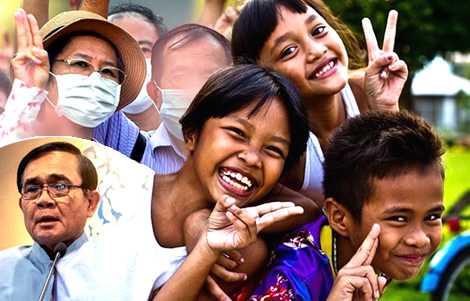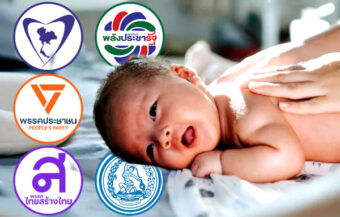The annual survey has become more sophisticated at measuring people’s happiness worldwide using the Gallup polling organisation in addition to government statistics across a range of metrics from social trust, generosity, freedom as well as economic well being and health data. After a year of sacrificing the economy and achieving one of the lowest death rates worldwide from the pandemic, the survey results will be both a disappointment and a wake-up call to the government in Thailand. The message is that the country’s problems are many and did not cease to exist because of the pandemic.
Thailand’s retention of its place as the 54th happiest country out of 149 nations surveyed for the World Happiness index, announced on Friday, is hardly good news for the Thai government. It comes after the kingdom suffered a 6.1% economic contraction for the year which saw it with one of the lowest death rates from the pandemic in the world. However, a surge in poverty and inequality as well as fears of crime combined with political instability, have set the country back since 2019 when it was ranked 52nd out of 156 countries and certainly from the period 2012 to 2015 when it came in 33rd on the list out of 157 countries. The trend is not good.

Thailand retained its position at 54th place when the annual World Happiness index ranking was published on Friday last.
The annual survey is produced by the Earth Institute at Columbia University.
The index uses a variety of measurements to calculate its rankings based on a range of metrics approved by the United Nations including continuously updated data relating to life expectancy, freedom, income, social welfare programmes, employment satisfaction, trust in government, inequality and feelings of generosity towards others.
Pandemic has dominated the world’s population since early 2020 and the year’s rankings now published
This year’s index, covering 2020, was dominated by the effects of the global pandemic which has seen over 2.7 million lives lost worldwide and has caused massive social upheaval in nearly every country in addition to GDP losses which average 5% on a global basis.
The figures have been far higher in Europe with France suffering a 9.5% contraction and the United Kingdom witnessing a 9.9% fall in economic output.
Thailand saw its economy shrink by 6.1% as the government took decisive measures to isolate the country from the threat.
By comparison, the United States suffered 165 deaths per 100,000 population in 2020 compared to just 0.13 per 100,000 in Thailand. However, the United States economy only contracted by 3.5%.
UK fared particularly badly in terms of both GDP loss and death rate from the Covid-19 virus in 2020
The United Kingdom appears to have suffered the worst of both worlds in 2020 as its death rate was higher than the United States at 190 deaths per 100,000 with nearly three times the economic contraction rate.
The country has recovered somewhat by staging one of the world’s most effective vaccination campaigns so far in 2021 with nearly 30 million people already having received at least one dose of a vaccine.
The Australian economy also fared badly with a 10% economic contraction but with a death rate of only 3.64 while New Zealand’s economy only saw a 2.9% economic fall off with a death rate of 0.53 people per 100,000.
Happiness is a broader and increasingly more accurate measurement of how a country is performing
The happiness index, however, is a broader and deeper exercise than just comparing key data from the pandemic in 2020.
A key partner in compiling and determining the index in recent years is the former US-based polling organisation Gallup which has been in business since 1935 but which has, in recent decades, taken on a larger mission supplying data to the corporate and administrative world on a broader basis.
Its polling and data can pick up attitudes across the globe among the populations of all countries being targeted by those behind making the annual index more informative and accurate.
Not good news for Thailand as it has slipped remarkably from 33rd to 54th in eight-years with fewer countries being ranked in the index
This is not good news for Thailand and the Thai government because despite the country’s economic sacrifice last year and the impressive performance in fighting the virus, the kingdom in the 2021 report, finds itself two places below its level in 2019 when 156 countries were surveyed compared to only 149 this year.
More concerning is that Thailand, according to World Happiness Index data, ranked in 33rd place from 2012 to 2015 out of 157 countries showing clearly a marked deterioration in the country’s prospects from then up to 2021.
China ranks 85th while the United States is down to 20th as many key countries also slipped slightly
During the period 2012 to 2015, China ranked 83rd while the United States was in 13th place, the United Kingdom in 23rd place, Germany in 16th, Australia in 9th and New Zealand in 8th place out of 157 countries. Denmark was the happiest country in those three years.
In the 2021 report based on 2020, the following are the comparative figures with 149 countries analysed.
China ranked 85th, the United States was 20th, the United Kingdom came in 18th, Germany was in 14th place, Australia 12th and New Zealand 10th.
Thailand’s woes include widening inequality, poverty and the level of political freedom in the country
The reasons are clear and relate to widening inequality in the kingdom, a direct consequence of the pandemic which has hit the poorest in the country hardest but also ongoing the economic effects despite the often stated commitment by the Thai government to tackling the issue.
In addition, the pandemic has coincided with the launch of an anti-establishment student-led protest movement in July 2020 which has questioned Thailand’s claim to be a fully functioning democracy which has led to authorities prosecuting those involved in increasingly violent street protests.
Student-led protest movement has led to questions over Thailand’s return to democracy in 2019
Thailand conducted a General Election in March 2019 which led to a 19 party coalition supporting the current Prime Minister Prayut Chan ocha, the leader of the 2014 coup, being elected as Prime Minister.
The current student-led protests have questioned the fairness of the 2017 Thai Constitution and demanded its reform, the removal of the government and have also begun to question the powers of the revered Thai monarchy.
US NGO, Freedom House, described the 2019 Thai General Election as ‘tainted’ in its latest report
The situation has led Freedom House, a US government-funded NGO, to downgrade Thailand to a country rated as ‘not free’ with a rating of 30 out of 100, a drop from its previous ranking in 2019 when the kingdom was rated 32 out of 100 and declared ‘partly free’.
However, the latest report by the US-based body also appears to question the legitimacy of the 2019 poll in Thailand: ‘The results, announced six weeks after the polls, were tainted by irregularities, with ballots ‘lost’, and initial vote tallies changed. Additionally, the formula for distributing party seats was altered after the election in order to reduce seats won by opposition parties and redistribute them to military-aligned parties,’ Freedom House declared in its recent report, published earlier this month.
Mental health worldwide has declined due to the Covid-19 virus crisis, so too in Thailand
One of the biggest impacts of last year’s response to the pandemic as well as the negative economic fallout for all countries has been a decline in mental health.
The authors of the index, for instance, found a 22% decline in mental health levels in the UK caused by the continuous lockdowns and economic upheavals. It warned that the effects of this may also be long term.
Similar fears were expressed last year by Thai health professionals and the Ministry of Public Health.
Loss of income, fear of unemployment and crime is now a major factor in Thai people’s lives and it may not just be all down to the Covid 19 pandemic
However, for Thais living in a country with a less comprehensive and generous social welfare system, the pandemic has left them dealing with higher rates of unemployment, a hitherto unknown phenomenon at least since the 1997 Financial Crisis, and also fears of a surging crime wave driven by mental health problems, financial distress and a growing drug-taking problem fueled by cheap narcotics flowing through the kingdom’s porous borders.
A Suan Dusit opinion poll, on Sunday, revealed that 66% of the Thai public was worried by either unemployment or the threat of unemployment while suffering lower levels of income for nearly a year now, a fact adduced by government reports and economic analysis presented by the Bank of Thailand.
This week’s poll also indicated that many Thais were not so sure the pandemic is the primary driver of their reduced economic status.
59% said it was related to the emergency but 61.5% said it was also an ongoing economic slowdown that Thailand has been experiencing since 2019.
The survey also revealed that just over 60% were worried about the threat of rising crime levels in the country.
Join the Thai News forum, follow Thai Examiner on Facebook here
Receive all our stories as they come out on Telegram here
Follow Thai Examiner here
Further reading:
A politically incorrect economic success: Thailand is home to some of the world’s richest people
Bright economic outlook for Thailand but the debt nightmare for poorer Thai people must be tackled
Noble spirit of Thailand’s elderly helps country deal with demographic problem
European expats moving to Thailand question UN yardsticks for quality of life


















